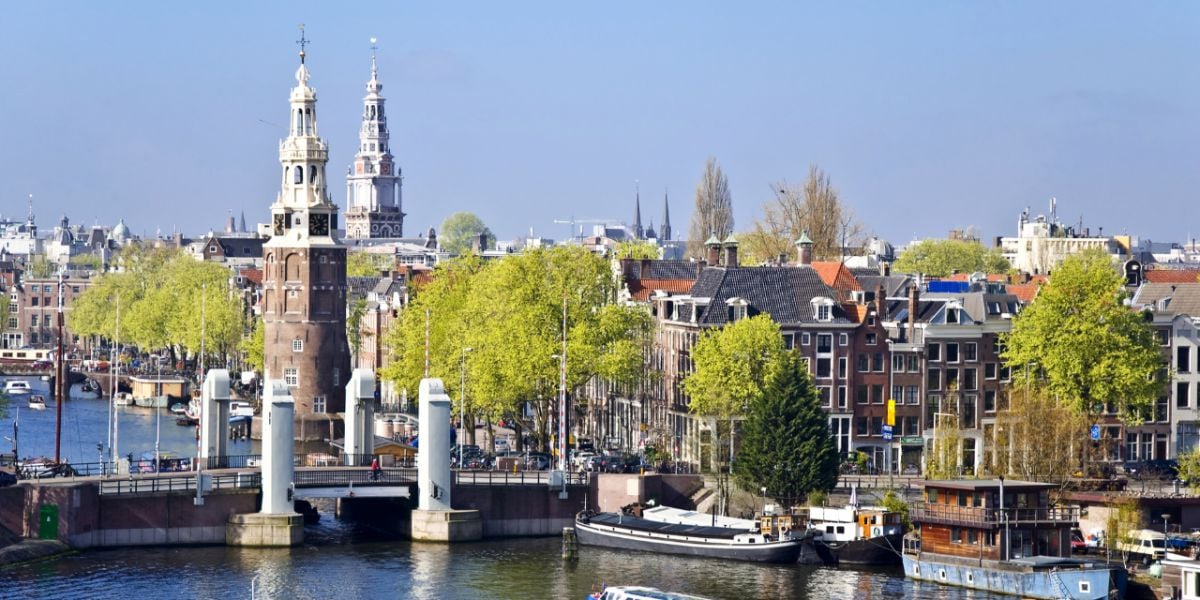
Over 918,000 people live in Amsterdam, which means there's a bit of competition when it comes to jobs. Add in the fact that it's easily commutable from other cities, and your competition's multiplied even more. Just because it's difficult doesn't mean it's impossible to secure a job, though. Here are a few ways you can increase your chances of finding employment in Amsterdam.
Which are the most promising fields in Amsterdam?
Amsterdam is a very diverse city, so you can bet there are many international corporate headquarters based here. This means it'll be easier to find a job in Amsterdam without speaking Dutch.
The most promising fields for work in Amsterdam are IT, business, manufacturing, finance, education, e-commerce, life sciences and health, media communications, renewable energy, and tech. Hospitality is also very in demand, as around 20 million tourists visit annually.
How to look for a job in Amsterdam?
Undutchables
Undutchables is an English recruitment agency made specifically for expats. You should register with this site, preferably before you move. You can upload your CV and utilize their job search function.
The greatest thing about this function is not only can you find jobs in Amsterdam but also in any other city that you're willing to commute to. If you find the competition is too high in Amsterdam, then we highly suggest you expand your search a little.
Undutchables is available in several different languages, which also means they have listings for opportunities that involve your native language or ones you're fluent in. This can increase your chances of landing a job and getting a higher salary as well. You can also set job alerts so you'll stay up-to-date about all the latest vacancies.
Indeed
You may already be familiar with Indeed.com since it's an American job search engine that serves the entire world. The Dutch version of Indeed works exactly the same as the English one. However, this website is entirely in Dutch; you can easily remedy that by using the translate function in your browser.
On this site, you can check reviews for employers before you submit applications. That way, you can ensure you work for someone who values you. In addition, you can check the salaries for various positions, as well as create a resume. These are all helpful tools to help you succeed in Amsterdam!
Talent.com
Talent.com (formerly Neuvoo) is a Dutch jobseeking website where you input a keyword and city, and it'll generate a list of available jobs. You can set specific parameters, like radius and companies.
You can also sign up for an email alert to know when jobs in certain sectors are available. In addition, you can look up the salaries for different positions and calculate your bruto (gross) and netto (net) take-home pay, which come in handy for taxes and figuring out your expenses.
Like Indeed, Talent.com is in Dutch, so you'll have to rely on your browser's translate function.
Make sure your LinkedIn profile is up-to-date, as many recruiters use this platform for headhunting. Not only can you use the job search function on LinkedIn, but you can also connect with friends and acquaintances to increase your chances of finding a job that's suitable for you. You can also leave each other recommendations so you can prove you have a good reputation.
Also, recruiters commonly reach out to you without you having to do anything at all. Because of this, you'll want to check your account often and respond promptly if any recruiter messages you with opportunities.
To make your profile more attractive, make sure you use a clear profile picture that's also professional; don't just pull any photo from Facebook. If you don't have any suitable photos, then take some against a neutral background in your home with good lighting. Make sure to wear professional clothing as well.
To make the most of your LinkedIn experience, you should add as many people as possible, but don't just add random people. Start with your contact list and add people you find who are in your desired industry or work at companies you're interested in.
You should also upload a resume. That way, when you find jobs you're interested in, you can apply and quickly attach your CV to complete the process. Don't make extra work for yourself; just duplicate the information you've got on your LinkedIn profile, or if you already have a resume, copy/paste that information onto your profile.
When you're ready, you can use the job search function on this platform. Put Amsterdam as your location and either hit the search button or type in the positions you want. Either way, you'll get instant results to browse through.
Make full use of LinkedIn by checking out all its features. For example, it has a resume, as well as talent pool reports. All of these can help you in your journey to the ideal career!
Monsterboard
Monsterboard.nl is a job search platform that's similar to the English platform Monster.com. This site is in Dutch as well, so you'll need to have your browser translate it for you.
Like on the Undutchables site, you can set the search parameters to include cities outside of Amsterdam so you can find more opportunities. Monsterboard also offers career advice and help for writing your resume and going through job interviews, as well as information about salaries and associated negotiations.
Alternatives to working in Amsterdam
Just like with housing, you're competing with a score of other people for a good-paying job, especially in a crowded city like Amsterdam. Not only is the Netherlands a small country, but it also has a great commuting infrastructure.
For instance, you can expand your search to Rotterdam. While it may seem very far away, there are trains that can get you there in just 40 minutes. Closer cities in the Randstad include Haarlem, Utrecht, and Leiden.
By keeping an open mind, you may be able to obtain employment quicker than if you'd limited your job search to just Amsterdam. Many companies also offer flexible days to work from home, so you may not need to work full-time in the office either. In recent years, the Flexible Working Act was added to the Working Conditions Act. This means that if you're with a company for six months (and it has at least 10 employees), you can ask to work remotely part-time, so keep this in mind while job searching.
How to write your resume in the Netherlands?
Writing a resume in the Netherlands is pretty much identical to how it's usually done; you can find many templates online that are great guidelines. But generally, you'll want to make it short and sweet; the Dutch are known for being direct and to the point, after all.
Your resume should just be two pages maximum, and it should include key details like your full name, address, email address, and phone number. You should have a brief introduction and then start listing your experience and education, making sure to use short and succinct bullet points. You can also include your skills and even hobbies at the end if you feel it's relevant to the role.
When you apply for a job in Amsterdam, make sure to include a cover letter, even if the posting doesn't require one. By taking the time to write one out, you may stand out from the crowd of other applicants who have only done the bare minimum.
Like with your CV, your cover letter should also be short; keep it at one page, maximum. Include your key details and start off the letter describing why you're drawn to the job and why you're a good fit. Don't forget to thank the reader for their time at the end before signing off.
Interview etiquette in Amsterdam
Make sure to arrive early for your interview; it's always good practice. Many offices are located in buildings that are hard to navigate, plus you may have to check in with the receptionist, so account for these things.
Also, print out a few copies of your CV to bring. If your interviewers don't have their own copies for any reason, this can score you some points. Plus, having a copy in front of you can reduce the chances of you getting flustered or not remembering some key details. You can always look down and get a good prompt from it.
In Amsterdam, job interviews are fairly casual, as many of the companies there are startups. It's not unusual for them to schedule an interview at a local cafe or in the cafeteria of their office building.
While you shouldn't wear anything too formal, avoid clothes that may come off as sloppy. Slacks or dark-colored jeans with a collared shirt are acceptable for males; slacks or a skirt with a nice blouse or a smart-casual dress are acceptable for females.
The unemployment rate in Amsterdam
The unemployment rate in Amsterdam as of 2022 was 4.8%, which was a little higher than the national average of 3.6%. But because Amsterdam is such a diverse city, it shouldn't be too hard to find a job, especially if you're looking for something in hospitality or retail. The pandemic left lots of openings to fill, so if you walk down the street, you're bound to see many shops with hiring signs up.
And better yet is, because Amsterdam is so full of tourists and is such a big melting pot, most places will hire you even if you don't know a word of Dutch. This will make it a lot easier to find employment when you arrive and need to get on your feet.
Wages in Amsterdam
Wages in the Netherlands are set by the government, and they're in tiers according to age. As of 1 January 2024, if you're over 21 years old, your minimum wage is €13.27 per hour. Before this date, there were weekly and monthly minimum wages too, but those have been eliminated. Those under 21 will receive lower wages, with the pay lowering as the age does.
The average salary for adults in the Netherlands is €47,000, and the average in Amsterdam is around €54,000. So you can expect decent wages in this city.
What is the work culture like in Amsterdam?
Amsterdam is one of the easiest places to adjust to work culture, as it's a melting pot, as mentioned before. This means that most workplaces will have an international feel and won't be very Dutch in nature.
You can expect people to speak English and many other languages, so you might be able to meet fellow expats from your home country and speak your native language if you're feeling homesick. In fact, in many offices, Dutchies are the minority, and the majority of the workforce are from all over the world. Because of this, you'll want to refrain from following the typical Dutch directness, as it comes off as abrasive and rude. You should also expect people to make small talk, as is the custom in many workplaces.
What you can expect in any Dutch office (including in Amsterdam) is for your voice to matter. Managers often mingle with their employees and ask for their honest opinions. They'll then work hard to implement changes for the better.
Another thing you can expect is after-work borrels, which usually happen on Fridays. These happen either in the office or at a nearby bar, and you'll have beers and borrelhapjes (small deep-fried bites) with your coworkers. It's a great way to relax and bond with those you see in the office every day.
Your paid vacation rights and employee packages in Amsterdam
By law, full-time employees must receive at least 20 paid days off. So it isn't uncommon for employers to offer 25 or more days. In addition, they're required to give you an 8% holiday pay, which you can use to fund your vacations!
To attract foreign talent, employers will also offer employee packages. Not only will they help with relocation costs, but they'll also help set you up with housing, which is terribly hard to find in the Netherlands, especially in Amsterdam. They'll also reimburse you for your children's school fees and your commute costs. Currently, you'll get €0.23 per kilometer with a cap of 214 working days. If you work less than five days a week but need to commute at least 128 days in a year, you'll enjoy the same travel allowance.
We do our best to provide accurate and up to date information. However, if you have noticed any inaccuracies in this article, please let us know in the comments section below.








